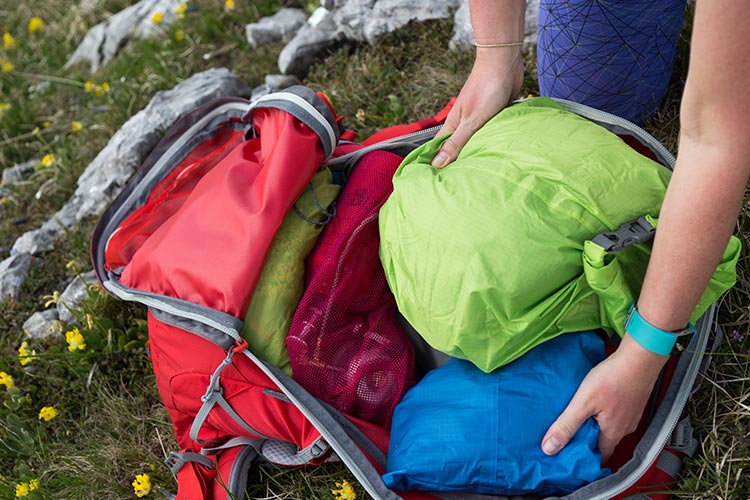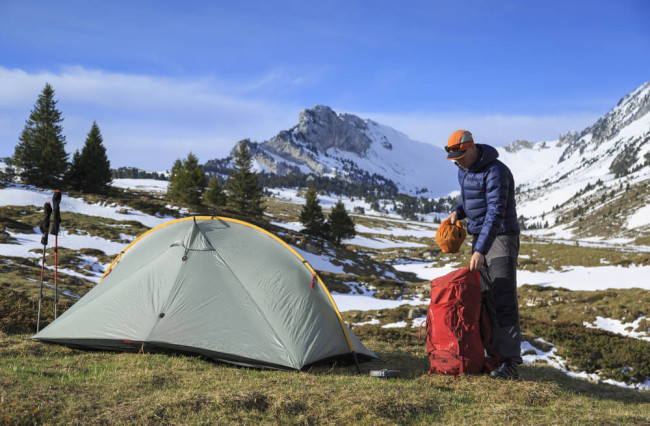
When you go camping or backpacking, it can be all too easy to take everything but the kitchen sink. However, this can very easily lead to overflowing rucksacks, aching backs and shoulders (and even injury), and generally a rather uncomfortable time of it.
If that sounds familiar, or you’d like to avoid any of that from the outset, then it might be worth considering lightweight camping.
What is lightweight camping?
On a very basic level, lightweight camping is pretty straightforward - just stripping out all the gear that isn’t essential, and choosing products that are more compact and weigh less than you’d perhaps normally take with you.
We can start to get really technical looking at pack weight, and really strip everything back if we want to talk about ultralight camping or backpacking. For instance, lightweight base pack weight is often defined as under 10kg, and ultralight as under 5kg.
However, we're not going to go that far. For the purposes of this guide, we’re going to keep it relatively simple and assume you’re someone who just wants to reduce the weight of the gear you’re carrying.
Those taking part in the Duke of Edinburgh’s Award, for instance, will want to keep their pack size down to a minimum, as might families who are fed up taking half their house with them when they go away.
Lightweight Camping Gear List
Obviously you should leave behind non-essentials, but what should you take with you? We’ve put together a lightweight camping gear list, with some helpful advice on what to look for when buying your camping equipment.
Lightweight camping tent
Your tent is probably going to be the heaviest piece of equipment you take with you, so it’s important to try and be as economical with space as you can. A one-person tent is ideal for the warmer months, although in winter you might want to consider a two-person tent to accommodate extra kit.
Wild Country & Terra Nova make excellent lightweight tents, but most brands have suitable selections. Take a look at all our lightweight tents for camping or backpacking, or check out our one-man tent buying guide.
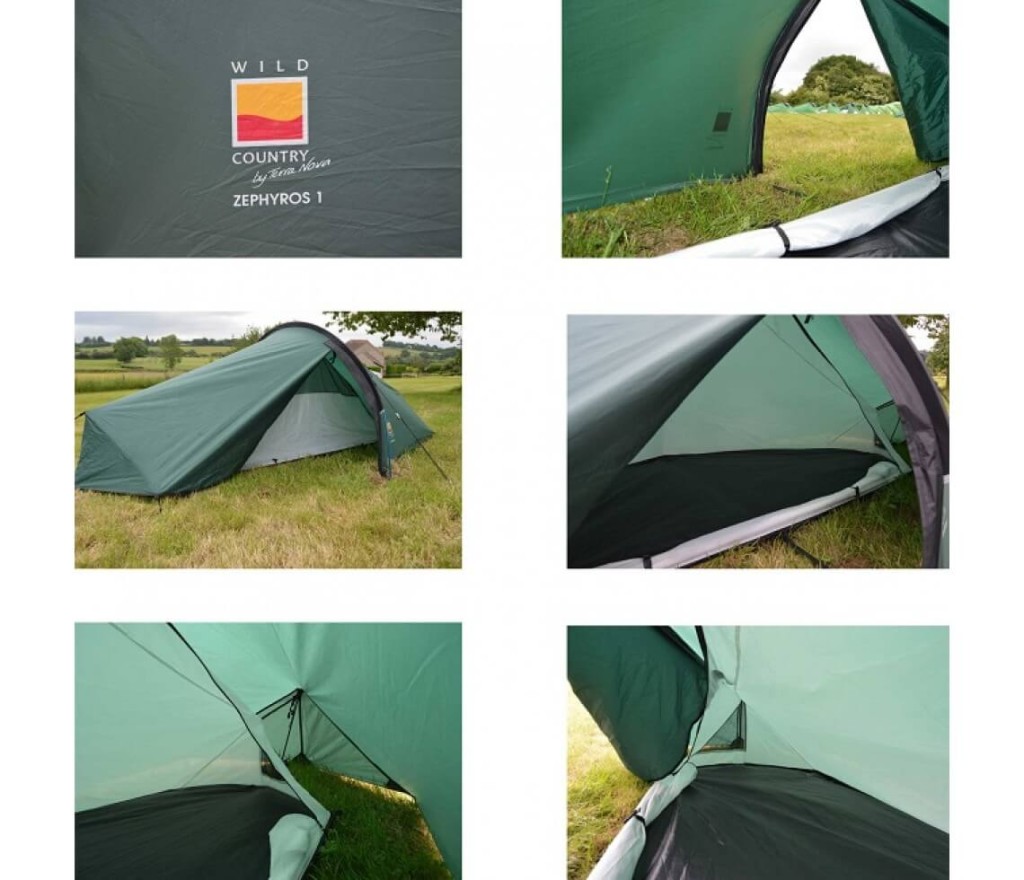
Lightweight sleeping bag
Getting a good night’s sleep is important, and going lightweight doesn’t mean you have to forego getting some decent shut eye. Mummy sleeping bags are a good choice, as they tend to be warmer, lighter and have a smaller pack size.
Then it’s a choice between down and synthetic filling. Down is lighter, packs smaller, and has incredible warmth-to-weight ratio - although it is more expensive, and damp/wet conditions can affect the performance of the bag. Synthetic is cheaper but generally heavier and bulkier.
Opt for a 1-2 season sleeping bag in nice weather to cut down on the bulk. You could use a 1-2 season bag even in colder weather, and just put more layers of clothing on or use a sleeping bag liner, but we’d always recommend having a sleeping bag that provides the appropriate level of warmth.
Shop all of our sleeping bags.
Lightweight sleeping mat
A good quality sleeping mat is also a key part of getting a good night’s sleep, so it’s worth getting a good one. Granted, you could opt not to take a mat if you really want to cut down on bulk, but we’d always recommend taking one.
¾ length self-inflating mats are a great option, as they’re nice and comfy and also pack pretty small. For winter, even if you’re trying to go lightweight, we’d still advise taking a full-length sleeping mat, as they’ll help reflect the heat back up to your body and reduce cold spots coming through the cold ground.
Shop all of our sleeping mats.
Lightweight stoves & cookware
If you’re going to be doing a spot of cooking, then you’re going to need a lightweight stove and cookware - unless you plan on making a fire, of course.
Jetboils are excellent at what they do, boiling water very quickly, but they can be a little bulky. This Vango folding gas stove is a good choice if you just want something simple.
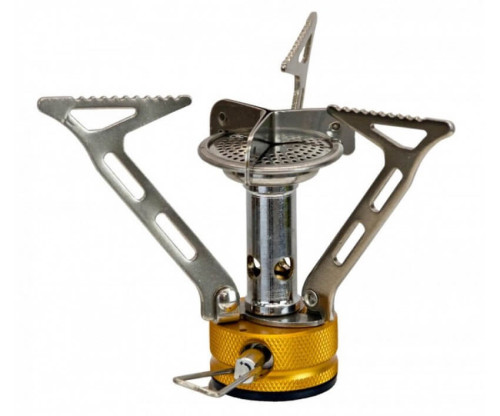
Sea to Summit also make some excellent lightweight and space saving cookware, such as collapsable bowls and other handy bits and pieces. If you’re cooking for one, then don’t bother with plates or bowls - just eat straight out of the pan!
Take a look at all of our camping stoves and cookers.
Lightweight rucksacks & backpacks
The time of year and extent of the lightweight camping trip will determine the size of rucksack you’ll need. Around 60L capacity should be fine for most activities - however, in summer you should be able to get away with an even smaller rucksack as you’ll need fewer layers and a thinner sleeping bag, requiring less room in your pack. We’d still recommend taking a dry bag to keep your kit dry and organised.
See all of our rucksacks or have a read of our rucksack buying guide for more information.
We have also produced a guide on how to pack a rucksack to make the most of the space you have available.
Clothing
Are you someone who packs enough clothes for a month away, even though you’re only going for a couple of nights? If so, you’ll have to cut back to only a couple of outfits.
Try layering thin clothing rather than bringing big, bulky items - baselayers are ideal for this, helping to keep you warm while taking up very little room. Garments made from merino wool are also good as it’s quite lightweight and dries quickly if it gets wet.
In terms of footwear, ditch the walking boots and try walking shoes or trail shoes instead. They’re much more lightweight and should be perfectly suitable for most short to mid-length walks.
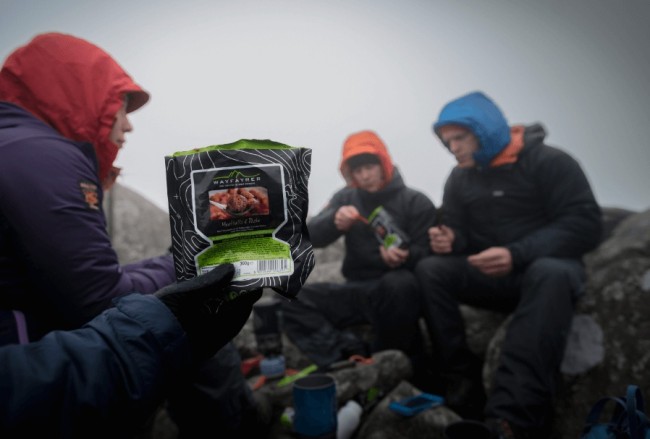
Food
Dried and dehydrated food is ideal. It won't spoil as easily, but it also packs much smaller than regular food. You can have whole meals without having to take all the ingredients separately - and don’t worry, they’re very tasty and nutritionally balanced!
We stock Wayfayrer and Adventure Food camping meals, both of which have a wide range of choices available.
Have a look at all our camping food.
Water
Water is absolutely essential to your wellbeing when camping or backpacking, so always make sure you have access to some, one way or another. You’ll need it for drinking and for cooking if you’re using dried food, so always ensure you have enough.
Use a collapsible water container, so when it’s empty, it’s much easier to store. Don’t bother with metal bottles; they’re far too heavy. You can also buy hydration bladders that will fit inside most rucksacks if you have space.
You may have access to natural fresh water while you’re away, such as a tarn, and if you want to get your water from there, make sure you have water purification tablets with you (it’s good to have some of these with you anyway). However, to be on the safe side, try and stick to running water if possible.
See all our camping water containers.
Bonus tips for lightweight camping
As well as the advice above, here are some handy camping hacks that will help you cut down on how much gear you take with you.
- Cut down the length of your toothbrush.
- Use a cheap foil emergency blanket under your sleeping mat for extra insulation.
- If you’re taking a map, cut out and take with you only the bit you need.
- Toilet paper - remove the cardboard centre, so it packs flat, and put it in a plastic bag.
- Cut up a straw. Fill the pieces with toothpaste for one-use packets. Seal the ends. with a lighter - be careful!
- Check the weather - by knowing what the weather's going to do, you can plan ahead and leave unnecessary gear at home.
- Use a head torch rather than carrying a bulky torch in your back. This also frees up your hands.
- Make a small first aid kit - put plasters, a few pills, antiseptic wipes, and whatever else will fit into a pill bottle.
- Dry out your gear - if it gets wet, then it's going to weigh a lot more than if it's dry.
- Use a hydration bladder rather than bottles of water. Some rucksacks come with space specifically for them.
- One of these Sea To Summit Sporks will give you a full set of cutlery.
- Use nearby rocks as tent pegs.
- Try a microfibre instead of a beach towel - lightweight, quick-drying and dirt-resilient.
- Use your pack instead of a pillow.
One last and very important tip is to never take any unnecessary risks when lightweight camping. Always make sure you have enough stuff with you to stay warm, fed and hydrated. You might want to cut down on weight, but you need to make sure you stay safe.
If you’re looking to do lightweight camping on a budget, then Winfields Outdoors is the place to be. Start shopping today!








